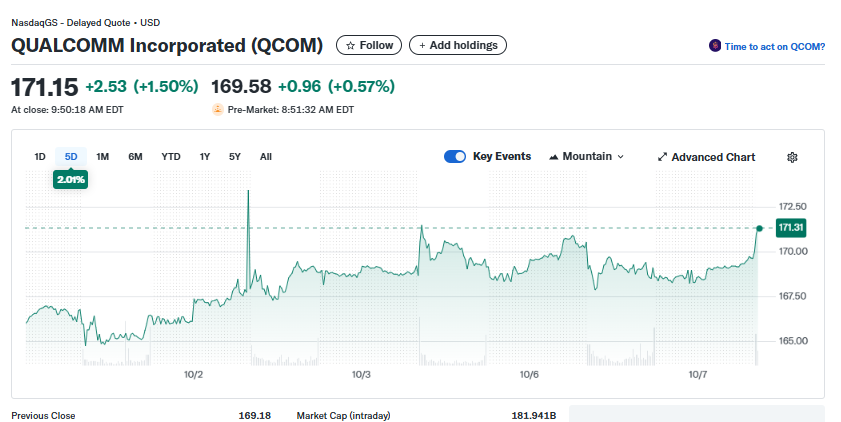TLDRs;
- Qualcomm stock rose 0.57% as UK tribunal begins £480M class action alleging abuse of smartphone chip market dominance.
- 29 million UK users may receive compensation for inflated Apple and Samsung smartphone prices tied to Qualcomm’s practices.
- Consumer group Which? leads the lawsuit, claiming Qualcomm’s royalty model stifled fair competition and raised device costs.
- Investors stay calm, with shares gaining despite regulatory scrutiny and potential multi-million-pound damages.
Qualcomm Inc. ($QCOM) shares edged higher in pre-market trading on Tuesday, up 0.57% to $169.58, as investors assessed the implications of a major £480 million class action lawsuit that opened this week in London.
The consumer-led case accuses the chipmaking giant of exploiting its dominance in the smartphone chipset and patent licensing markets, allegedly driving up handset prices for millions of UK users.
The case, spearheaded by consumer advocacy group Which?, began its first phase on Monday before the UK Competition Appeal Tribunal (CAT). The five-week trial will determine whether Qualcomm unfairly leveraged its market power in dealing with smartphone manufacturers such as Apple (AAPL) and Samsung Electronics (005930.KS), both key clients in its global supply network.

29 Million Consumers May Benefit
The lawsuit represents around 29 million UK consumers who purchased Apple or Samsung smartphones between October 1, 2015, and January 9, 2024.
According to Which?, these users may be eligible for compensation of about £17 (US$22.91) per device if the claim is upheld, totaling roughly £480 million (US$647 million) in potential damages.
Which? argues that Qualcomm used its control over essential chip technology to impose inflated licensing fees, which manufacturers were forced to accept under the threat of supply disruption. These inflated costs, the group says, were then passed on to consumers in the form of higher smartphone prices or compromised device quality.
During opening arguments, Philip Moser KC, counsel for Which?, told the tribunal that Qualcomm’s licensing practices “foreclosed a normal discussion” of fair royalty rates.
“Qualcomm’s message was clear,” he said. “‘Accept our package on our terms or there are no chips.’”
A Huge Moment for Accountability
Which? Chief Executive Anabel Hoult hailed the case as a “huge moment” for consumer protection in the UK’s tech sector.
“It shows how the power of consumers ,backed by Which? – can hold the biggest companies to account if they abuse their dominant position,” Hoult said in a statement.
Hoult added that class action mechanisms are essential for ordinary consumers to seek justice against large corporations.
“Without Which? bringing this claim, it would simply not be realistic for people to pursue damages individually,” she said.
If the tribunal finds that Qualcomm indeed abused its dominance, a second trial will follow to assess the extent of the harm and determine the precise damages to be awarded.
Stock Strength Despite Legal Clouds
Despite the legal pressure, Qualcomm’s stock remained resilient. After closing slightly lower at $168.62 (-0.33%) on Monday, shares rose 0.57% in pre-market trading Tuesday, signaling limited investor concern over the ongoing trial.
Analysts believe the muted market response reflects Qualcomm’s track record of weathering similar antitrust challenges in other regions, including the EU and South Korea, where it has previously faced regulatory scrutiny and fines.
Market watchers suggest that investors view this case as a manageable legal risk, given Qualcomm’s strong fundamentals and continued leadership in 5G and AI-driven chip technologies. However, a ruling against the company could set a powerful precedent, potentially influencing regulators in other jurisdictions to pursue similar actions.
Qualcomm is expected to present its opening defense Tuesday, maintaining that its licensing model is fair, pro-competitive, and critical for funding continued innovation in mobile and wireless communications.








